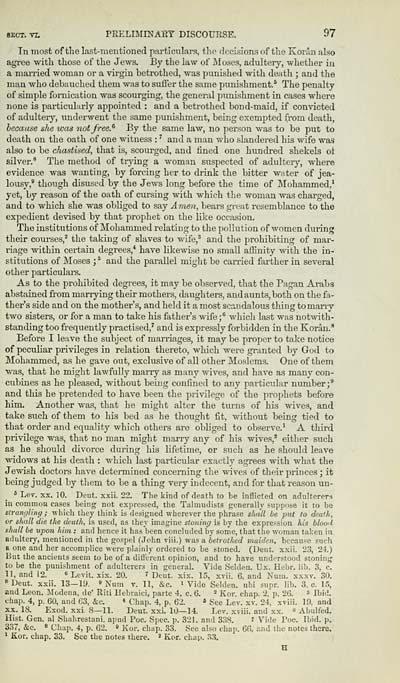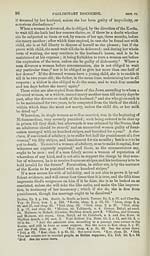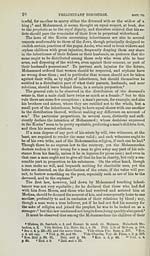Download files
Complete book:
Individual page:
Thumbnail gallery: Grid view | List view

SECT. VI. PEELIMENARY DISCOURSE. 97
In most of the last-mentioned parti ctilars, tho decisions of the Koran also
agree with those of the Jews. By the law of Moses, adultery, whether in
a man-ied woman or a virgin betrothed, was punished with death ; and the
man who debauched them was to suffer the same punishment.* The penalty
of simple foiTiication was scourging, the general pimishment in cases where
none is particuLirly appointed : and a betrothed bond- maid, if convicted
of adultery, imderwent the same punishment, being exempted from death,
because she was notfree.^ By the same law, no person was to be put to
death on the oath of one witness : ' and a man who slandered his wife was
also to be chastised, that is, scoui-ged, and fined one hundred shekels ot
silver.* The method of tiying a woman suspected of adultery, where
evidence was wanting, by forcing her to diink the bitter w;iter of jea-
lousy,* though disused by the Jews long before the time of Mohammed,'
yet, by reason of the oath of cui-sing with which the woman was charged,
and to which she was obliged to say A men, bears great resemblance to the
expedient devised by that prophet on the like occasion.
The institutions of Mohammed relating to the pollution of women dui-ing
their courses,^ the taking of slaves to wife,'' and the prohibiting of mar-
riage within certain degrees,* have likewise no small affinity with the in-
stitutions of Moses ; * and the parallel might be carried farther in several
other particulai-s.
As to the prohibited degrees, it may be observed, that the Pagan Arabs
abstained from mariying their mothers, daughters, and aunts, both on the fo-
ther's side and on the mother's, and held it a most scandalous thing to many-
two sisters, or for a man to take his father's w-ife;® which last was not\vith-
standing too frequently practised,' and is expressly forbidden in the Koran.'
Before I leave the subject of mariiages, it may be proper to take notice
of peculiar privileges in relation thereto, which were gi-anted by God to
Mohammed, as he gave out, exclusive of all other Moslems. One of them
was, that he might lawfully many as many wives, and have as many con-
cubines as he pleased, without being confined to any particular number;'
and this he pretended to have been the privilege of the prophets before
him. Another was, that he might alter the tm-ns of his wives, and
take such of them to his bed as he thought fit, without being tied to
that order and equality which others are obliged to observe.' A third
privilege was, that no man might many any of his wives,* either such
as he should divorce dm-ing his lifetime, or such as he should leave
widows at his death : which last particular exactly agrees with what the
Jewish doctoi-s have determined concerning the wives of their princes ; it
being judged by them to be a thing very indecent, and for that reason un-
* Lev. XX. 10. Deut. xxii. 22. The kind of death to be inflicted on adulterers
in common cases being not expressed, the Talmudists generally suppose it to be
stranrjliiiff; which they think is designed wherever the phrase shall be put to death,
or shall die the death, is used, as they imagine stoning is by the expression his bloo'l.
shall be upon him ; and hence it has been concluded by some, that the woman taken in
adultery, mentioned in the gospel (John viii.) was a betrothed maiden, because such
R one and her accomplice were plainly ordered to be stoned. (Deut. xxii. 23, 24.)
But the ancients seem to be of a different opinion, and to have understood stoning
to be the punishment of adulterers in general. Vide Selden. Ux. Hcbr. lib. 3, c.
11, and 12. « Levit. xix. 20. 7 Deut. xix. 15, xvii. 6, and Num. xxxv. 30.
8 Deut. xxii. 13-19. » Num v. 11, &c. i Vide Selden. ubi supr. lib. 3. c. 15,
and Leon. Jlodena, de' Riti Hebraici, parte 4, c. 6. ^ Kor. chap. 2, p. 26. » Ibid,
chap. 4, p. 60, and G3, &c. * Chap. 4, p. 62. » See Lev. xv. 24, xviii. 19, and
XX. 18. Exod. xxi 8—11. Deut. xxi. 10—14. Lev. xviii. and xx. " Abulfed.
Hist. Gen. al Shahrestani, apud Poc. Spec. p. 321. and 338. 7 Vide Poc. Ibid. p.
337, &c. 8 Chap. 4, p. 62. » Kor. chap. 33. See also chap. 60, and the notes there.
' Kor. chap. 33. See the notes there. * Kor. chap. .3.3.
In most of the last-mentioned parti ctilars, tho decisions of the Koran also
agree with those of the Jews. By the law of Moses, adultery, whether in
a man-ied woman or a virgin betrothed, was punished with death ; and the
man who debauched them was to suffer the same punishment.* The penalty
of simple foiTiication was scourging, the general pimishment in cases where
none is particuLirly appointed : and a betrothed bond- maid, if convicted
of adultery, imderwent the same punishment, being exempted from death,
because she was notfree.^ By the same law, no person was to be put to
death on the oath of one witness : ' and a man who slandered his wife was
also to be chastised, that is, scoui-ged, and fined one hundred shekels ot
silver.* The method of tiying a woman suspected of adultery, where
evidence was wanting, by forcing her to diink the bitter w;iter of jea-
lousy,* though disused by the Jews long before the time of Mohammed,'
yet, by reason of the oath of cui-sing with which the woman was charged,
and to which she was obliged to say A men, bears great resemblance to the
expedient devised by that prophet on the like occasion.
The institutions of Mohammed relating to the pollution of women dui-ing
their courses,^ the taking of slaves to wife,'' and the prohibiting of mar-
riage within certain degrees,* have likewise no small affinity with the in-
stitutions of Moses ; * and the parallel might be carried farther in several
other particulai-s.
As to the prohibited degrees, it may be observed, that the Pagan Arabs
abstained from mariying their mothers, daughters, and aunts, both on the fo-
ther's side and on the mother's, and held it a most scandalous thing to many-
two sisters, or for a man to take his father's w-ife;® which last was not\vith-
standing too frequently practised,' and is expressly forbidden in the Koran.'
Before I leave the subject of mariiages, it may be proper to take notice
of peculiar privileges in relation thereto, which were gi-anted by God to
Mohammed, as he gave out, exclusive of all other Moslems. One of them
was, that he might lawfully many as many wives, and have as many con-
cubines as he pleased, without being confined to any particular number;'
and this he pretended to have been the privilege of the prophets before
him. Another was, that he might alter the tm-ns of his wives, and
take such of them to his bed as he thought fit, without being tied to
that order and equality which others are obliged to observe.' A third
privilege was, that no man might many any of his wives,* either such
as he should divorce dm-ing his lifetime, or such as he should leave
widows at his death : which last particular exactly agrees with what the
Jewish doctoi-s have determined concerning the wives of their princes ; it
being judged by them to be a thing very indecent, and for that reason un-
* Lev. XX. 10. Deut. xxii. 22. The kind of death to be inflicted on adulterers
in common cases being not expressed, the Talmudists generally suppose it to be
stranrjliiiff; which they think is designed wherever the phrase shall be put to death,
or shall die the death, is used, as they imagine stoning is by the expression his bloo'l.
shall be upon him ; and hence it has been concluded by some, that the woman taken in
adultery, mentioned in the gospel (John viii.) was a betrothed maiden, because such
R one and her accomplice were plainly ordered to be stoned. (Deut. xxii. 23, 24.)
But the ancients seem to be of a different opinion, and to have understood stoning
to be the punishment of adulterers in general. Vide Selden. Ux. Hcbr. lib. 3, c.
11, and 12. « Levit. xix. 20. 7 Deut. xix. 15, xvii. 6, and Num. xxxv. 30.
8 Deut. xxii. 13-19. » Num v. 11, &c. i Vide Selden. ubi supr. lib. 3. c. 15,
and Leon. Jlodena, de' Riti Hebraici, parte 4, c. 6. ^ Kor. chap. 2, p. 26. » Ibid,
chap. 4, p. 60, and G3, &c. * Chap. 4, p. 62. » See Lev. xv. 24, xviii. 19, and
XX. 18. Exod. xxi 8—11. Deut. xxi. 10—14. Lev. xviii. and xx. " Abulfed.
Hist. Gen. al Shahrestani, apud Poc. Spec. p. 321. and 338. 7 Vide Poc. Ibid. p.
337, &c. 8 Chap. 4, p. 62. » Kor. chap. 33. See also chap. 60, and the notes there.
' Kor. chap. 33. See the notes there. * Kor. chap. .3.3.
Set display mode to: Large image | Transcription
Images and transcriptions on this page, including medium image downloads, may be used under the Creative Commons Attribution 4.0 International Licence unless otherwise stated. ![]()
| Early Gaelic Book Collections > J. F. Campbell Collection > Koran: or, Alcoran of Mohammed > (119) |
|---|
| Permanent URL | https://digital.nls.uk/77135404 |
|---|
| Description | Volumes from a collection of 610 books rich in Highland folklore, Ossianic literature and other Celtic subjects. Many of the books annotated by John Francis Campbell of Islay, who assembled the collection. |
|---|
| Description | Selected items from five 'Special and Named Printed Collections'. Includes books in Gaelic and other Celtic languages, works about the Gaels, their languages, literature, culture and history. |
|---|

